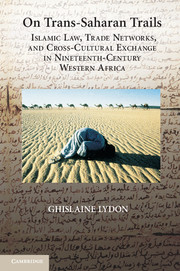 On Trans-Saharan Trails
On Trans-Saharan Trails Book contents
- Frontmatter
- Contents
- Acknowledgments
- Note on Language
- List of Abbreviations
- Glossary
- Maps
- 1 “Making History” Across the African Divide
- 2 Trans-Saharan Trade in the Longue Durée
- 3 Markets and the Movement of Caravans: Nineteenth-Century Developments
- 4 Guelmīm and the Wād Nūn Traders
- 5 The Organization of Caravan Trade
- 6 Business Practice and Legal Culture in a Paper Economy of Faith
- 7 Trade Networks and the Limits of Cooperative Behavior
- 8 On Trans-Saharan Trails
- Appendix 1 Nineteenth-Century Events
- Appendix 2 Pillaged Caravans Reported in the Chronicles
- Bibliography
- Index
4 - Guelmīm and the Wād Nūn Traders
Published online by Cambridge University Press: 02 July 2009
- Frontmatter
- Contents
- Acknowledgments
- Note on Language
- List of Abbreviations
- Glossary
- Maps
- 1 “Making History” Across the African Divide
- 2 Trans-Saharan Trade in the Longue Durée
- 3 Markets and the Movement of Caravans: Nineteenth-Century Developments
- 4 Guelmīm and the Wād Nūn Traders
- 5 The Organization of Caravan Trade
- 6 Business Practice and Legal Culture in a Paper Economy of Faith
- 7 Trade Networks and the Limits of Cooperative Behavior
- 8 On Trans-Saharan Trails
- Appendix 1 Nineteenth-Century Events
- Appendix 2 Pillaged Caravans Reported in the Chronicles
- Bibliography
- Index
Summary
Khaymat Bayrūk fī Wād Nūn, mulūk ʿalā rijāla, wa al-mulk a-thānī mā yakūn dūn mulk al-jalālā. (The Bayrūk family of Wād Nūn owns men, and there is no other kind of possession except that of kings.)
Beginning of a praise poem by Tikna Griot Shaykh NdiartoHathā shayʿ a-llā al-Tikna wa ʿabīdhā. (This is something only the Tikna and their slaves are capable of.)
Tikna sayingIn 1252/1836, during his three-month sojourn in the Wād Nūn town of Guelmīm, John Davidson, the British traveler, wrote diary entries that repeatedly announced the impending arrival of the large caravan or akābār returning from Timbuktu. He conveys the suspense lingering in the air as the people awaited with great anticipation the inbound camel train. But that year, the caravan never made it to port, or at least not in one piece, as it was raided by Saharan brigands who pillaged most of its loads before it reached the sūq, or market, of Guelmīm. A recent outbreak of smallpox also had kept people from going to market, and so that year the annual fair of Sīdī al-Ghāzī was a fiasco, much to the annoyance of Shaykh Bayrūk, the Tikna chief of Guelmīm.
In the nineteenth century, Guelmīm was the largest town in the region. It was a crossroads of Saharan and Atlantic exchange, operating as a terminus for caravan traffic coming from various Saharan oases and the southern desert-edge markets of western Africa.
- Type
- Chapter
- Information
- On Trans-Saharan TrailsIslamic Law, Trade Networks, and Cross-Cultural Exchange in Nineteenth-Century Western Africa, pp. 160 - 205Publisher: Cambridge University PressPrint publication year: 2009


